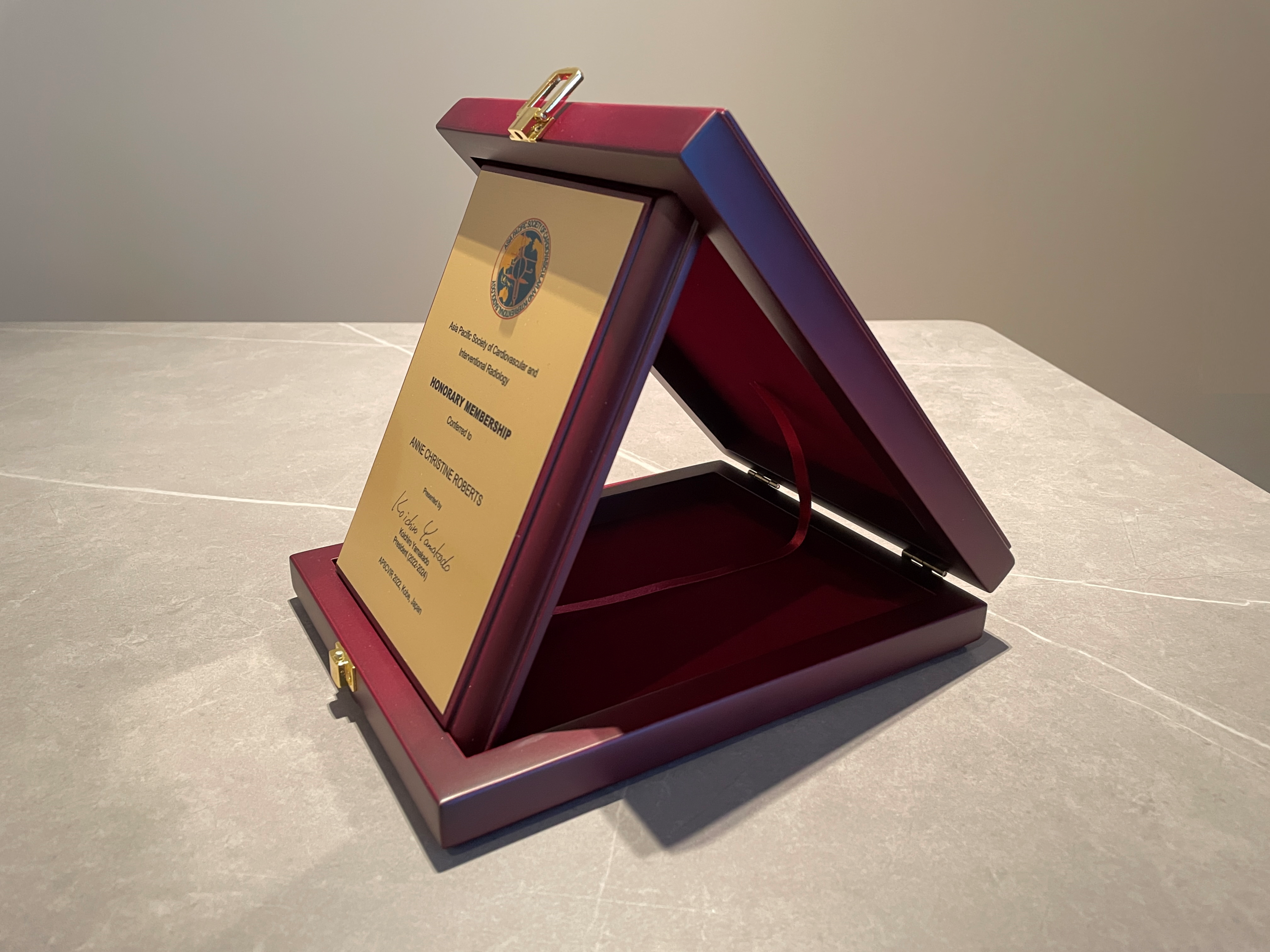
Honorary Membership
Honorary Membership of the Asia Pacific Society of Cardiovascular and Interventional Radiology (APSCVIR)
APSCVIR Honorary Members


Lindsay Machan
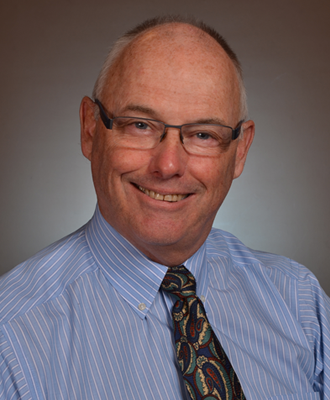
Brian F Stainken
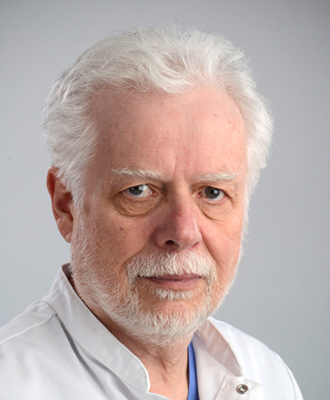
Jim Reekers
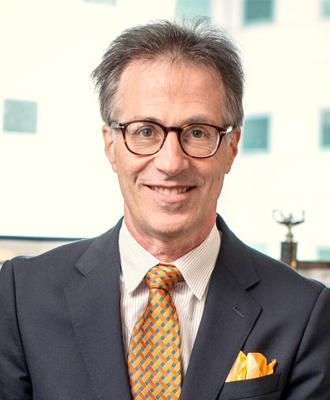
Ziv J Haskal

Andreas Adam
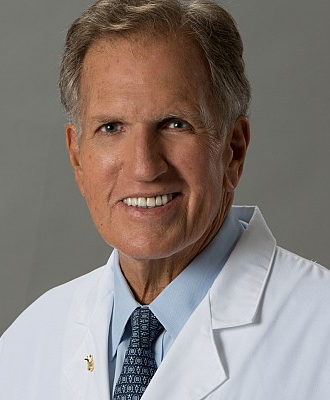
Barry Katzen
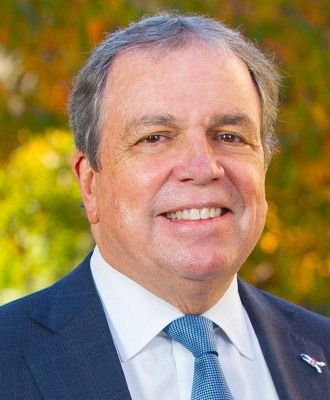

Honorary Membership of the Asia Pacific Society of Cardiovascular and Interventional Radiology (APSCVIR)








Dr Anne Roberts is currently Professor of Radiology at the Dept of Radiology, UCSD Medical Centre and Thornton Hospital. Dr Roberts is a distinguished and highly decorated Interventional Radiologist with outstanding academic achievements and contributions to the field of IR. Her accolades include past President of SIR (1996), SIR Dotter Lecturer (2004), CIRSE Andreas Gruntzig Lecturer (2005), CIRSE Distinguished Fellow Award (2009), SIR Gold Medal (2015) and American College of Radiologists Gold Medal (2022). Dr Roberts has been a staunch supporter of APSCVIR for many years and have regularly participated in our conferences as teaching faculty. She has lectured and shared her IR knowledge and expertise at many conferences and workshops in various countries in the Asia Pacific region. She has also helped trained IRs from the Asia Pacific region by way of VIR Fellowships and attachements in her Department. Dr Roberts is an outstanding academic IR with extensive contributions to clinical, research and education in IR. She has more than 200 publications and more than 700 invited lectures at national/international conferences, including several keynote and named lectures (Dotter and Andreas Gruntzig lectures). She has served on numerous hospital, university, professional societies and government committees, the more notable ones include Chief of Radiology, UCSD Medical Centre Thornton Hospital, President of Western Angiographic and Interventional Society, President of SIR, Member of FDA's Circulatory System Devices Panel, Vice President of ACR, Panel member of the Medicare Coverage Advisory Committee, Trustee of the American Board of Radiology. She has won many awards for her distinguished service and contributions to IR, notably the CIRSE Distinguished Fellow Award (2009), SIR Gold Medal (2015), UCSD Department of Radiology Lifetime Achievement Award (2017) and American College of Radiologists Gold Medal (2022).
Anne Roberts
Professor Afshin Gangi MD PhD is an invited professor at Kings College London and the Chief of Interventional Radiology at the University Hospital Strasbourg France. He trained in Reims and Strasbourg and has held his chair in Strasbourg since 2000. He is part of the CNRS (Centre national de la recherche scientifique) and has twice won the “Victoire de la Médecine” in 2009 and 2010 France. He has published 188 papers and has 40 book contributions. He has delivered 430 lectures or scientific papers. He has a special interest in the cryoablation of Bone and the preservation of bone architecture. He is regarded as the authoratative voice in Bone cryoablation and is known throughout the world. Prof Afshin Gangi is the CIRSE President since 2019 till current. Prof Gangi, well known as a titan in his field, has been instrumental in growing the academic and clinical development of percutaneous osseous interventions and cryoablation in the Asia Pacific Region, having personally trained a number of Asia Pacific IRs (including Australia Hong Kong, Malaysia, India, Singapore) , in addition to being a regular speaker at APSCVIR meetings. His gregarious personality, his generosity in sharing his insight and his relentless pursuit for innovation has inspired many in this part of the world.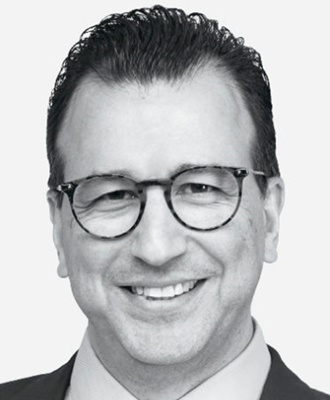
Afshin Gangi
Associate Professor Lindsay Machan is an Interventional Radiologist at the Vancouver Hospital and Associate Professor of Radiology at the University of British Columbia. After an interventional fellowship with Dr. Joachim Burhenne in Vancouver, Dr. Machan worked with Professors David Allison and Sir Andy Adam at the Hammersmith Hospital in London and Stan Cope at the University of Pennsylvania in Philadelphia. A love of hockey lured him back to the University of British Columbia! Throughout his career, Dr Machan has been a pioneer and innovator in new technologies. He has issued or in process approximately 140 patents. He co-founded Angiotech Pharmaceuticals which developed and licensed the paclitaxel coated stent and became publicly traded on the TSE and NASDAQ exchanges. In 2006 he shared the Manning Innovation Principle Award for the paclitaxel eluting stent. In 2010 Dr. Machan co-founded Ikomed Technologies which is developing methods for reducing radiation dose during fluoroscopy with great experimental results. Dr. Machan is a founding member of the Canadian Interventional Radiology Association and a past president of the Western Angiographic and Interventional Society. Besides being an outstanding innovator, Dr Machan is an excellent educator and proceduralist. He sits on commercial and Scientific Advisory Boards for multiple Canadian and US medical companies and is actively involved in clinical practice, research and teaching at Vancouver Hospital.
Lindsay Machan
Brian F Stainken is a practicing Interventional Radiologist and Chair of the Radiology Department at The Stamford Hospital in Stamford Connecticut. He is a honors program graduate of Boston College and attended Georgetown University School of Medicine on a full scholarship from the US Navy. He completed Residency in San Diego and Fellowship at UCLA. After training he served on the faculty at UCSD, Albany Medical College and the University of Maryland before entering into private practice in 2004 in Providence RI, moving to Connecticut 12 years later. He has been active in the early stage research in the area of cryoablation, and mechanical thrombectomy. More recently he was among the early adopters of radioembolization in the US. For over 20 years he has been a vocal supporter of improved collaboration amongst international IR societies and development of IR services internationally. For this work he has been awarded honorary fellowship/membership in the US, European, Chinese, and Asia Pacific Interventional Radiology Societies. A past president of SIR, Dr Stainken currently serves on the society’s board as International Division Councilor.
Brian F Stainken
Professor Jim Reekers is an internationally recognized Interventional Radiologist. He is Professor of Interventional Radiology at the University of Amsterdam, The Netherlands and he is working at the Academic Medical Center in Amsterdam. He has been President of the Cardiovascular and Interventional Society of Europe (CIRSE) from 2007-2009 and Chairman of the European School for Interventional Radiology (ESIR). A pioneer of subintimal angioplasty, Professor Reekers has also developed numerous techiques, catheters and filters. Professor Reekers has published widely on numerous IR topics and presented at multiple international conferences. But perhaps his most important contribution to IR has been his untiring efforts to establish IR as an evidence- based and clinical trial-driven discipline. Professor Reekers is currently Editor in Chief of the new open access journal CVIRendovascular. In 2010, Professor Reekers started the Jim Reekers Foundation – an initiative to support research and science in Interventional Radiology (IR). The JRFoundation donates travel grants to European students, residents and fellows in training, for scientific presentations about IR at an international medical meeting in Europe.
Jim Reekers
Dr Ziv J Haskal is a tenured professor of radiology at the University of Virginia School of Medicine. After training under the mentorship of Dr Ernest J Ring, at the University of California, San Francisco, he joined the faculty of the University of Pennsylvania, and then moved to build interventional services at both the New York-Presbyterian Hospital/Columbia University, and the University of Maryland. As professor and chief at both institutions, he established new IR admitting services and outpatient IR clinics, markedly expanded adult and pediatric clinical programs, and created internationally successfully funded research and training programs. Many of his fellows and mentees have become world-renowned interventional radiologists and researchers. His research has spanned the breadth of IR, including defining early research in TIPS and complex portal hypertension. His preclinical experimental and human studies led to creation of the TIPS endograft, a device used by the majority of physicians worldwide, resulting in markedly improved patient outcomes and reduced symptoms and reintervention. Some snapshots of his research include preclinical validation and human interventional transarterial gene vector delivery in one of the first human gene therapy trials, first demonstration of IR radiation eye injury risks at occupational levels, accelerated pharmacomechanical deep vein interventions, advances in hemodialysis access care, embolization, and interventional oncology. He has designed, led or participated in more than 40 clinical and animal research trials. His early interest in advancing the rigor of IR science led to multiple multi-center randomized clinical trials (when few had been IR-led). Dr Haskal’s ground breaking work in the use of access stent grafts proved them to be the first therapy superior to angioplasty. He has published more than 350 scientific articles, abstracts, chapters, and books. Dr Haskal has given more than 500 invited lectures worldwide and been awarded numerous honorary fellowships, national and international awards for innovation, leadership, service, and research excellence (recently twice winning Abstract of the Year awards). He was awarded the 2014 “Leaders in Innovation” by the Society of Interventional Radiology Research Foundation. In 2007 Dr Haskal chaired the SIR Annual Scientific Meeting. He co-founded the Global Embolization Symposium and Technologies (GEST) meeting. Since 2010, Dr Haskal has been editor-in-chief of the Journal of Vascular and Interventional Radiology. He has served in many societal leadership and committee positions – among them the SIR Executive Council and the SIR Research Foundation Board, chaired numerous committees and has held memberships within the American Heart Association, American College of Cardiology and American College of Radiology.
Ziv J Haskal
Andreas Adam is Professor of Interventional Radiology at the University of London and Clinical Director of Clinical Imaging and Medical Physics at Guy’s and St Thomas’s Hospital, London. He trained in medicine at the Middlesex Hospital Medical School, after which he spent four years in internal medicine, cardiology and oncology. He then trained in radiology at the Royal Postgraduate Medical School, obtaining Fellowship of the Royal College of Radiologists. He is also a Fellow of the Royal College of Physicians and the Royal College of Surgeons. In 1992 he was appointed to the first professorial chair of interventional radiology in Europe, at King’s College London. In 2012 -2015 he served as Dean of the first state medical school in Cyprus. His research work has shaped clinical practice internationally and has been recognised by the award of Fellowship of the Academy of Medical Sciences. He has made extensive original contributions to the medical and scientific literature, has published eleven books, and has served as Editor-in-Chief of Cardiovascular and Interventional Radiology. Professor Adam was one of the architects of the European Society of Radiology (ESR), which he helped to create by merging the European Congress of Radiology (ECR) with the European Association of Radiology (EAR). He has held the presidencies of eight national and international societies, including the Royal College of Radiologists and the European Society of Radiology. He has received numerous honours and awards, including fifteen eponymous lectures, Honorary Fellowship of sixteen national radiological societies, five gold medals and two Honorary Doctorates. In 2012 he was made a Commander of the Most Excellent Order of the British Empire in recognition of his contributions to interventional radiology.
Andreas Adam
Barry T. Katzen is the founder and chief medical executive of the Miami Cardiac & Vascular Institute, a part of Baptist Health South Florida. He is Chairman of the Interventional Radiology Department, Herbert Wertheim College of Medicine, Florida International University (only the 3rd Dept. of Interventional Radiology at a medical school in the United States); and Professor of Radiology at the University of South Florida, Morsani College of Medicine. Since the Institute was founded in 1987 under Dr. Katzen’s leadership, it has served as a national model of success in multidisciplinary cooperation. Dr. Katzen graduated from the University Of Miami School Of Medicine in 1970. He completed an internship in internal medicine at Jackson Memorial Hospital and a residency in diagnostic radiology at the New York Hospital/Cornell Medical Center. He was awarded a fellowship in cardiovascular radiology at St. Vincent’s Hospital Medical Center and the University of Rome. He established the interventional radiology program, cardiac catheterization laboratory and noninvasive vascular laboratory at Alexandria Hospital in Virginia in 1976, where he pioneered the use of sophisticated video and audio technology to enhance the process of education for practitioners. He is credited with being the first to use “live patient demonstrations” in the United States, which became the benchmark for procedural education in endovascular therapy and many other procedural areas of medicine. Dr. Katzen has had a longstanding interest in clinical research and been a national site principal investigator for many clinical trials in the study of aneurysms, carotid artery disease, and peripheral vascular disease and has been involved in the development of colleagues created the Endovascular Forum, one of the first interactive websites for physicians about circulatory disease. He is the co-founder of ICSciences, a Boston-based company, which utilizes the web to improve communication and education for patients. Dr. Katzen has received numerous awards, including: the Society of Interventional Radiology’s (SIR) Gold Medal for Lifetime Achievement; the Gold Medal of the University of Miami Alumni Association and entered into the “Hall of Fame” at the UM Medical School, only the fourth such honoree in medical school history at that time; the first American to receive the annual Gold Medal award from the Cardiovascular and Interventional Radiological Society of Europe (CIRSE) for his distinguished achievements in the field of interventional radiology, both in the United States and worldwide; the Career Achievement Award presented at the 2007 Transcatheter Therapeutics (TCT) Conference for his worldwide leadership in endovascular medicine; and in 2007 the establishment of the “Barry T. Katzen Medical Directorship” at Miami Cardiac & Vascular Institute by Cook Medical.
Barry Katzen
Dr. Michael Dake is Senior Vice President of Health Sciences at the University of Arizona (UA) and Professor of Medical Imaging, Surgery and Medicine, as well as, Thelma and Henry Doelger Professor of Cardiothoracic Surgery Emeritus at Stanford University School of Medicine. The UA Health Sciences includes the UA Colleges of Medicine (Phoenix and Tucson), Nursing, Pharmacy and Mel and Enid Zuckerman College of Public Health, with main campus locations in Tucson and the growing Phoenix Biomedical Campus in downtown Phoenix. Previously, he served as Division Chief of Interventional Radiology for 15 years at Stanford before being named Chairman of the Department of Radiology at the University of Virginia. He returned to Stanford in 2008 where he focused on developing endovascular procedures to manage patients with thoracic and abdominal diseases. In addition, his research interests include the use of drug-eluting stents and balloons for the treatment of peripheral arterial disease and the use of percutaneous therapies to address a range of venous lesions. In addition to specialty certification in Diagnostic Radiology and Vascular and Interventional Radiology, Dr. Dake is board certified in Internal Medicine and Pulmonary Disease.
Michael Dake